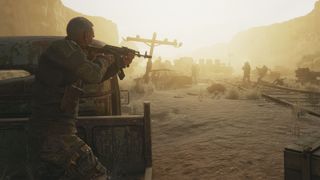Metro Exodus is still just as dank and miserable as I hoped it would be
4A Games' entry into open world gameplay retains the series' bleak atmosphere.

As far as I can tell, Metro Exodus is a continental post-apocalyptic train adventure, beaten into the shape of a first-person shooter. Series protagonist Artyom and his wife Anna have joined the Aurora, an eastbound train whose destination is vague, but the gist of it seems to be: Get as far away from Moscow as possible.
When I jump into Metro Exodus, the entourage has reached as far as the Caucasus. The train has broken down near the Caspian Sea or, actually, in the Caspian Sea. You see, the Caspian Sea has been drained. It’s dusty and flyblown, ridden with bandits. Because it’s a semi-desert landscape ridden with bandits, the comparisons to Mad Max will no doubt come thick and fast. But 4A Games’ approach to oppressive heat and desperation is far bleaker, much more unsettling.
I can almost smell the rot as I approach the bandit camp. Snakes and irradiated scorpions scatter as I loot gutted caravans and crates along the way. Statue-like mutants lay prostrate waiting to attack, while others press upright against walls, in a pose vaguely reminiscent of Return to Oz’s traumatising wheelers.

Metro is just about the only game set in (almost) entirely dark tunnels that I love. Fallout 3 had too many boring, repetitive tunnels. I’ll generally give up on any game as soon as I reach a sewer dungeon. They’re boring and repetitive. But I loved inhabiting the subterranean hellscapes of the first two Metro games: The setting works because they're among the most atmosphere-rich games that I’ve ever played. I like them enough to replay them every couple of years.
So when I heard that Metro Exodus would boast wide open spaces, I wondered whether 4A Games could imbue these wider environments with the unease and anxiety the Metro series has mastered in the past. First impressions suggest the studio has done so: The Caspian level is miserable, unpleasant to navigate, and ridden with creatures that made my skin crawl. We’re on the right track, then.
4A’s willingness to plunge the player into fearsome total darkness applies as much to its open air environments as it does to its tunnels. The storm weather in Exodus is among the most intimidating and elemental that I’ve experienced in a game, and driving through the desert landscape in a shat-out van through storm and gale is… excruciating, terrifying, unpleasant, eerie. Most games make allowances for player comfort when it comes to depictions of darkness (by which I mean, a lack of light). But Metro makes you suffer it. It’s great.

I stole the van from the bandit camp I was sent to investigate. After that, I scaled a hilltop lighthouse that offered sweeping wasteland views. Along the way I’m shooting things, of course: Bandits, mutants, occasionally other ugly creatures. The weapons are as ragtag and improvisational as always; prone to jamming, in need of care and attention. They can be customised extensively with different stocks, muzzles, modifiers—incendiary ammo can be used in shotguns.
PC Gamer Newsletter
Sign up to get the best content of the week, and great gaming deals, as picked by the editors.
But all of that is a distraction. In 2019, high budget single-player shooters are few and far between, and most tend to sideline mood and environment detail (Doom and Wolfenstein, weirdly, are two recent exceptions to that rule). It’s a stroke of luck that 4A Games is among the studios still pedaling the campaign FPS grindstone, because there’s something pleasingly severe about Metro. Its survival horror elements don’t overwhelm its first-person shooter aspirations—weapons and ammunition aren’t particularly scarce. There’s no lack of twisted monstrosities in these games either, but I appreciate that most of the unease in a Metro game comes from the mood of the environments rather than, say, the fear of a two-headed rat ripping your face off.
Metro isn’t afraid to take itself seriously and it isn’t afraid to make you feel miserable. How utterly European. According to publisher spokespeople at the event I attended, Exodus will comprise a handful of open-ended levels, pieced together by a series of shorter and more conventional levels.

The Caspian was large and foreboding, and even though I could’ve explored it if I wanted to, I just didn’t want to. It was too ugly, too miserable, and what if it stormed? Games like Far Cry 5 feel listless and inane because I can just walk from one end of the map to the other, day or light, rain or shine, and that journey won’t matter a bit. So experiencing the Caspian—or rather, choosing not to experience much of it, because it's terrifying—brings me relief that Metro isn’t wandering down that path.
No, Metro Exodus will have you mustering courage, finding or crafting gas mask canisters, making sure your weapons are in good nick. Nothing is done frivolously, nothing is killed for the pleasure of killing. There’s a frantic violence to the shooting. It’s been too long since I’ve felt like this.
The Caspian is undeniably monotonous, but never mind: Exodus has other open worlds at hand, including the well-documented Volva level, and—new to me—the Taiga, which I also played briefly. Compared to what we’ve previously seen of Exodus, this region is a heavenly utopia: lush forests beneath gentle blue skies, a calmly forking river, abundant deer. Wandering the small dirt pathways through this landscape, a stampede of deer is pursued by a pack of wolves on the far horizon. There is definitely going to be violence here. There will definitely be dark, underground warrens I’ll need to explore. There will be creatures that make me wince. But for the first time in the series’ history, there’s also something beautiful. Three hours with Exodus made me want it more than I could ever have anticipated.
Shaun Prescott is the Australian editor of PC Gamer. With over ten years experience covering the games industry, his work has appeared on GamesRadar+, TechRadar, The Guardian, PLAY Magazine, the Sydney Morning Herald, and more. Specific interests include indie games, obscure Metroidvanias, speedrunning, experimental games and FPSs. He thinks Lulu by Metallica and Lou Reed is an all-time classic that will receive its due critical reappraisal one day.
Most Popular


